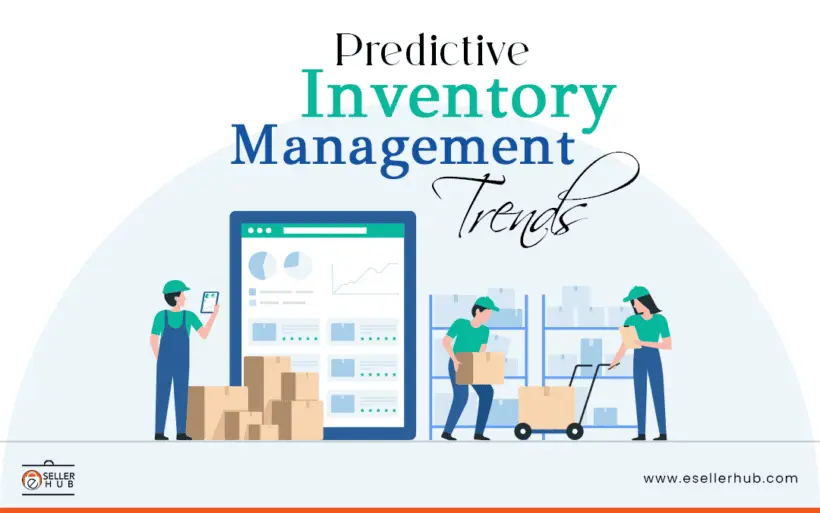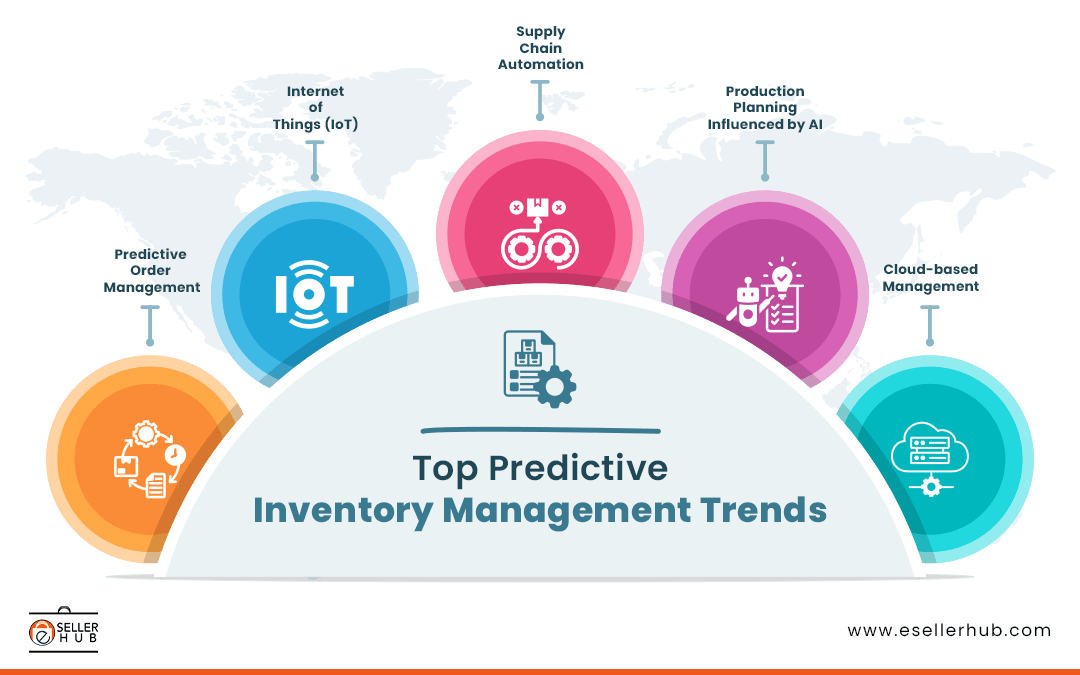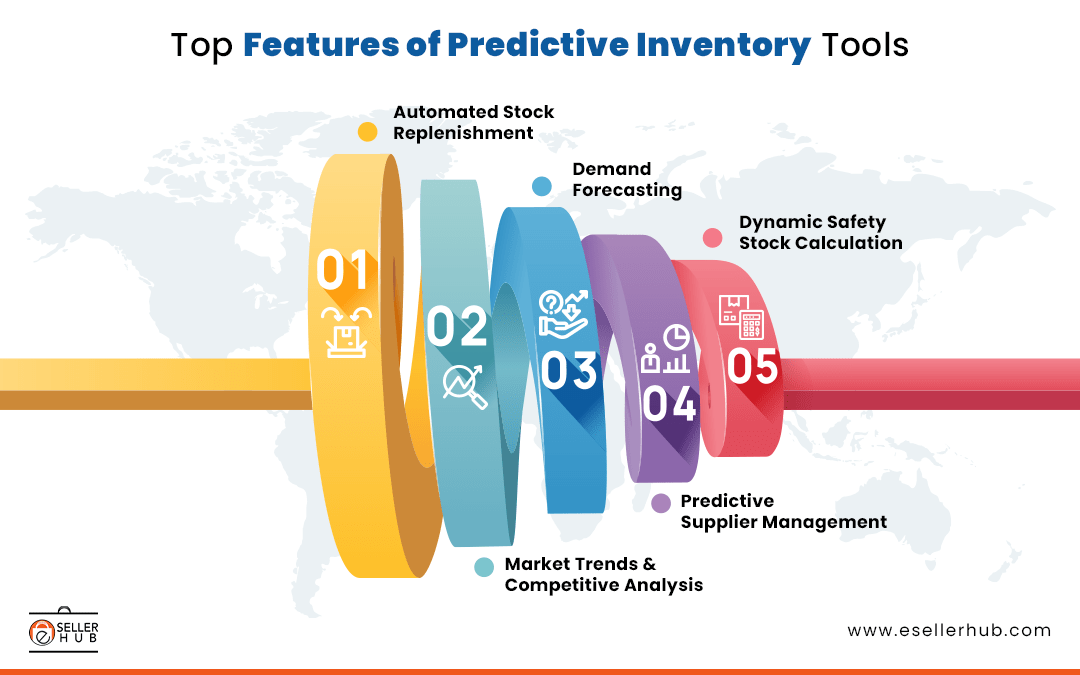Table of Content
Latest Posts

The rapidly evolving eCommerce space requires sellers to be aware of consumer demands, more of as a necessity than an advantage. Nothing can work smoothly for any business you take if the inventory management process is not streamlined.
Keen monitoring of inventory operations lets sellers distinguish between a smooth, efficient operation and a business burdened by costly overstock or missed sales due to stockouts. Predictive inventory management helps sellers stay ahead in the market by employing the capabilities of AI and ML.
Predictive inventory management effectively addresses the challenges of inventory management, including monitoring global supply networks, market demand shifts, and cost fluctuations. Let’s explore how the upcoming eCommerce trends in inventory management can help sellers optimize their business operations.
Predictive trends represent the future of eCommerce, shifting businesses from a reactive to a proactive, data-driven approach. Having been in the industry for almost a decade, we have witnessed firsthand how incorporating predictive capabilities into eCommerce management has transformed business operations in many ways.
Here’s a further look into the predictive management trends and how they shape the eCommerce landscape.

The pitfalls of the Order management process directly affect customers and how they perceive the brand experience. Predictive order management involves quick order-picking efficiency, accurate order delivery, and no errors in order packing and shipping.
This continuously collects user activity data and lets sellers fetch relevant information on frequently purchased products, frequently bought together products, etc., to help with inventory replenishment. Employees can stock such items closely to increase picking efficiency.
Read More :Explore ways for an efficient order management process
Installing IoT devices or sensors to monitor production line operations and inventory management accordingly provides sellers with real-time updates on inventory levels and quantity in transit. This data provides sellers with accurate stock counts and order fulfillment processes and simplifies internal operations, which may result in an approximate 15% decrease in inventory expenses.
Many online retailers are exploring ways to automate inventory acquisition, supported by real-time data analytics tools. With historical and real-time data, predictive AI analysis enables teams to make precise predictions about seasonal demands, allowing them to modify orders with the suppliers.
With predictive AI integration, sellers can modify production schedules in response to real-time data, similar to automated supply chain management systems. To ensure that current market demands are addressed and necessary manufacturing activities are expanded or dropped accordingly.
eCommerce sellers increasingly use cloud-based inventory management systems to increase visibility into inventory operations regardless of the location. Teams can access software data via mobile devices without any need to be physically present at the site.
Cloud-based inventory management is hosted on remote servers, providing accessible, real-time data over the Internet. This approach allows businesses to manage inventory more efficiently, access information from anywhere, and improve decision-making.
Read More: Automation in Inventory Management Process
Predictive inventory management software offers features designed to streamline operations and maximize profit margins. Here’s a classification of the primary functionalities businesses can expect:

AI-driven demand forecasting analyzes customer behavior, historical trends, and even macroeconomic indicators to identify market demands accurately. At eSellerHub, we have helped clients integrate demand forecasting modules that autonomously adjust inventory recommendations based on predictive analytics. For our clients, this has led to better stock availability during high-demand periods and lower holding costs during off-peak times.
In many cases, keeping the right amount of stock is highly required. Predictive tools automate stock replenishment based on expected demands, taking the guesswork out of the equation. With this feature, we’ve helped many clients maintain optimal stock levels without overstretching their budget on excess inventory or risking stockouts during peak sales.
Traditional safety stock calculations are based on past sales averages, often failing to consider sudden demand surges. With predictive inventory management features, businesses can dynamically calculate safety stock, considering market shifts, trends, and external factors like supply chain disruptions.
Predictive inventory management extends beyond inventory alone—it extends to suppliers. AI can proactively identify potential delays or shortages in the supply chain and adjust reorder schedules.
Keeping track of competitor behavior and market trends has become essential in e-commerce. By analyzing competitor stock levels and pricing adjustments, predictive tools can provide insights to refine inventory strategy further.
Predictive inventory management is a long-term investment in operational efficiency and profitability. Here’s how AI-based inventory tools help e-commerce businesses optimize processes:
By accurately predicting demand, businesses can maintain inventory at optimized levels. This reduces the costs associated with storing and handling excess inventory, a significant advantage for companies with fluctuating product demand.
In an era of sky-high customer expectations, stockouts and backorders can lead to dissatisfaction and poor reviews. Predictive tools ensure businesses maintain the right products in stock, even during unexpected demand spikes, translating to a superior customer experience. AI-enabled software has resulted in higher fulfillment rates, reducing order cancellations and customer churn for many businesses.
With real-time data at their fingertips, e-commerce sellers can make quicker, more informed decisions. For instance, if a specific product shows an unexpected demand spike, predictive analytics enable businesses to respond proactively rather than scrambling after stockouts.
As more e-commerce businesses turn to predictive AI solutions, they often face implementation challenges—building the right predictive modules, integrating with existing systems, or ensuring compatibility with varied marketplaces. The eSellerHub team has expertise in creating custom e-commerce solutions that meet each business’s unique needs.
Whether it’s developing demand forecasting, automating replenishment, or implementing market trend analysis, our team at eSellerHub has the expertise to take inventory management systems to the next level. From small businesses to enterprise clients, we’ve helped countless e-commerce operations embrace the future of predictive inventory management, optimizing their stock levels, reducing costs, and enhancing their ability to compete effectively.
As the e-commerce industry becomes more competitive and complex, inventory management will continue to play a vital role in determining a business’s success or failure. Predictive inventory management trends are no longer just optional add-ons but essential investments for any e-commerce seller looking to thrive.
At eSellerHub, we’re committed to helping clients stay ahead of these industry changes, offering custom-built solutions. With our expertise, e-commerce sellers can build predictive inventory management software that drives profitability, enhances customer satisfaction, and keeps them at the forefront of the industry.